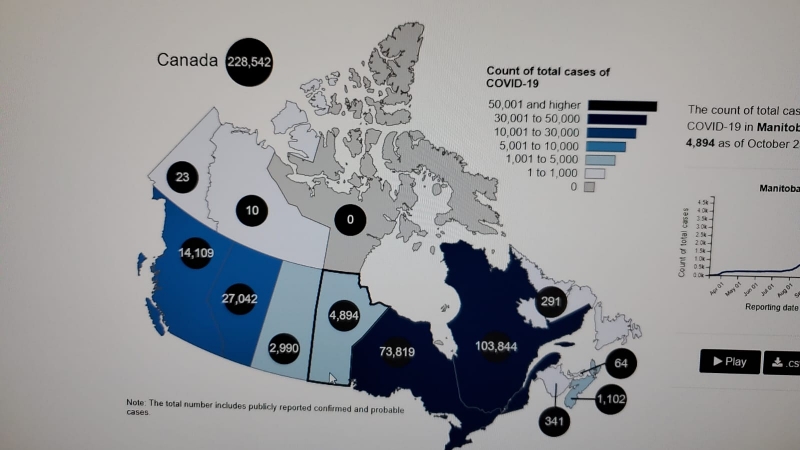According to Canadian government data, more than 90% of deaths from Covid-19 nationwide have been reported in the two largest provinces (states), Ontario and Quebec. Among the cities, cosmopolitan Montreal, the largest in Quebec, ranks second among cases, with approximately 40,000 registered. In the locality, where Bruno Almeida Filho, from Porto Alegre, has lived for two years, the main changes observed compared to the first phase of the disease have been greater awareness of the population and the widening of the age group. of perceived contagion. “In the first wave, most of the patients were elderly, a problem that worsened in homes and clinics. Now, school-aged children are the most affected, ”explains Gaucho, an information technology technician at Herzing College Montreal.
According to him, seeing Canadians more aware and committed to care and prevention, the changes in behavior from the new phase of the disease do not appear to be that different from the previous one. However, the government’s stance on the charges and restrictions has been firmer. In a recent statement, Canadian Prime Minister Justin Trudeau acknowledged the population’s fatigue in the face of the routine imposed by the pandemic, but outlined the need for tougher measures to curb the spread of the virus across the country.
Among the main changes noted by Almeida Filho is the adoption of a government-launched app to identify and track those infected, and notify likely contacts. “The application tracks contacts and warns you, via Bluetooth communication, if the person has crossed paths with a sick person. Anyone who is infected or infected is marked and anyone who passes or has passed them is invited to take charge of the symptoms, ”he explains.
Restaurants and bars can only operate for on-site delivery and pickup. Photo: Bruno Filho / Disclosure / JC
According to him, Montreal is in lockdown for 28 days to try to contain the new spread of the coronavirus, and the border with the United States remains closed. Supermarkets are always open, but restaurants are only for delivery and payment and take out. The recent controversy has been the closure of gymnasiums and sporting venues, an attitude that has sparked protests from citizens, who consider physical activity essential for maintaining physical and mental health during the pandemic. “Overall, I see that people are more prepared for this second wave, more aware of and more respectful of distance and social isolation, now facilitated by the onset of winter,” he comments.
At the university where he works, only professors are free for face-to-face activities on certain days a week, to transmit lessons online, and very few students circulate on campus. Among the new measures adopted at the site are the installation of glass to separate tables and receptions, the adoption of single-flow markings in the corridors and the ban on the use of common areas, such as cafeterias (photo).
Failure to comply with restrictions is enforced and generates fines
About 200 kilometers from Montreal, in the city of Gatineau, where Maria Helena Jacob, a physical educator from Porto Alegre lives, the most notable changes and restrictions compared to the second wave are related to greater control over meetings and to agglomerations. According to her, the government has asked the population to avoid rallies and gatherings, especially on weekends. “As young people and adults under 60 are now the most infected, this is a factor that has been highlighted by the government, which called not to meet,” he comments.
 Cases of Covid-19 are increasing in Canada, which is experiencing the second wave of the disease. Photo: Maria Helena Jacob / Disclosure / JC
Cases of Covid-19 are increasing in Canada, which is experiencing the second wave of the disease. Photo: Maria Helena Jacob / Disclosure / JC
The peculiarity of the city, which is smaller and crime-free, even allows the local police to monitor the behavior of the population, receiving reports of visits or settlements, which can generate fines of up to a thousand dollars. Canadian. “A neighbor received a visit from her boyfriend and the presence of her car in front of the house was reported by someone. not allowed not to live in the same house, ”he said.
Another recent curiosity is the ban on visits to the surroundings in search of candy for Halloween, a traditional holiday there, celebrated this Saturday (31). In the city of Ottawa, near the border with Gatineau, there was even a warning from the mayor not to have the celebration, to avoid the movement of people.
Maria Helena, who lost her job as a researcher at a university due to the pandemic, and is currently working in the region at a health facility, reports that the social impact of Covid-19 is seen mainly in relation to layoffs or suspensions of contracts and social rights, and new placements with lower wages. As a result, she also began to receive government assistance. “Another problem is that, while high schools and universities continue to teach remotely, many administrative servers are made redundant or have reduced social benefits, which has a big impact on the local economy,” emphasizes- he does.

“Evil alcohol lover. Twitter junkie. Future teen idol. Reader. Food aficionado. Introvert. Coffee evangelist. Typical bacon enthusiast.”
